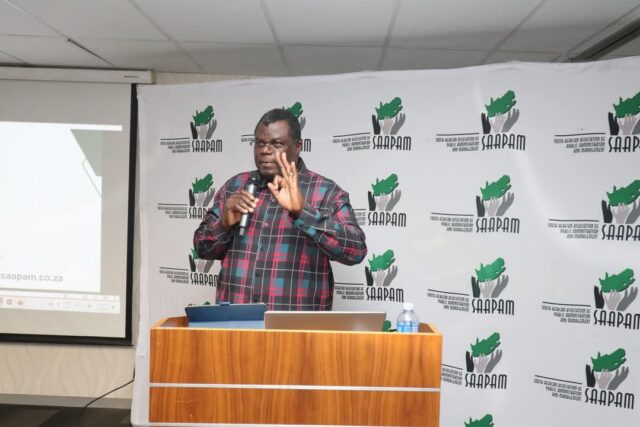In a significant milestone for the professionalisation of the public sector, the South African Association of Public Administration and Management (SAAPAM) has been formally recognised as a professional body by the South African Qualifications Authority (SAQA).
This landmark development was the focus of a high-level dialogue held at the National School of Government session on “Implications of SAAPAM–SAQA Recognition for University Leadership†today, 29 May 2025.
The event, attended by leaders in academia and government, underscored the growing convergence between higher education institutions and the state’s strategic transformation agenda. The Department of Public Service and Administration (DPSA), represented by Acting Director-General (ADG) Mr. Willie Vukela, hailed the occasion as a powerful step towards embedding professionalism, ethical leadership, and institutional capability across all levels of government.
“This gathering reflects a growing and necessary convergence between academic excellence and the state’s strategic transformation agenda. The Department of Public Service and Administration values this moment as a signal of a deeper shift towards embedding professionalism, ethical leadership, and capability across the public service through education, standards, and partnership,†ADG Vukela remarked.
In his remarks, ADG Vukela added that SAAPAM’s new status offers an “opportunity to anchor public administration not only as a discipline of scholarly pursuit but as a profession with structure, accountability, and impact.â€
According to ADG Vukela, this new status grants SAAPAM the authority to confer professional designations, influence academic curricula, and implement continuing professional development (CPD) systems. Moreover, it will enable SAAPAM to work closely with Quality Councils to ensure qualifications meet both national and sectoral standards, further aligning education with real-world public service demands.
With SAAPAM’s recognition, higher education institutions find themselves at a critical juncture. Universities must now integrate professional standards and values outlined in Chapter 10 of the Constitution into public administration curricula. This includes ethical governance, service excellence, and developmental leadership.
“Universities are no longer peripheral contributors,†the ADG noted. “They are now co-architects of a citizen-centred, professional public service. Their programmes must evolve to produce graduates who are ready to lead, innovate, and restore public trust.â€
Academic programmes will be required to go beyond theory, cultivating ethical acumen, policy competence, and technological fluency. The DPSA stressed that the new curricula must directly impact service delivery and enhance institutional performance, preparing graduates for both employment and public sector transformation.
According to the Acting Director-General, SAAPAM’s recognition is a critical enabler of its reform agenda. It provides a partnership opportunity to formalise mechanisms to advance key tenets of the Professionalisation Framework, including career progression, ethical accountability, and competency-based recruitment, he added.
“This development ensures the realisation of the Batho Pele principles through a competent and ethical workforce. It also aligns with national and global priorities, including the National Development Plan, AU Agenda 2063, and the United Nations Sustainable Development Goals,†ADG Vukela said.
MPSA collaboration with SAAPAM and academic institutions will now extend beyond policy discourse to include the co-development of, or contribution to, professional standards, curriculum content, and implementation of continuing professional development pathways.
As South Africa moves to institutionalise public administration as a recognised and respected profession, the DPSA Acting Director-General called upon all stakeholders—universities, educators, policy practitioners, and government departments—to act with urgency.
“Each institution must review and strengthen its internal capacity to rise to this moment,†the DPSA urged. “Let us move forward together to embed professional standards into every facet of our public administration system—from lecture halls to community service delivery.â€









